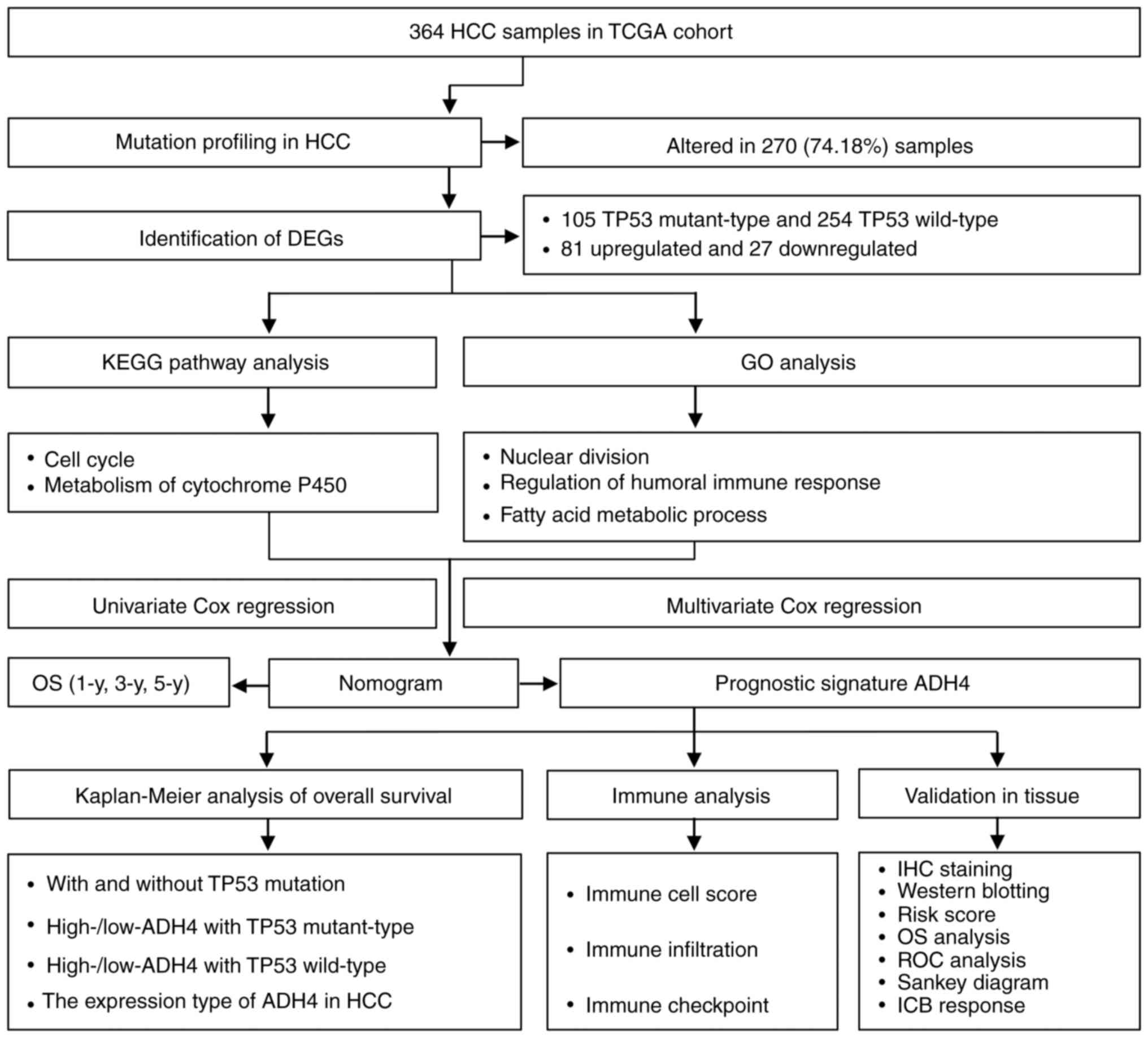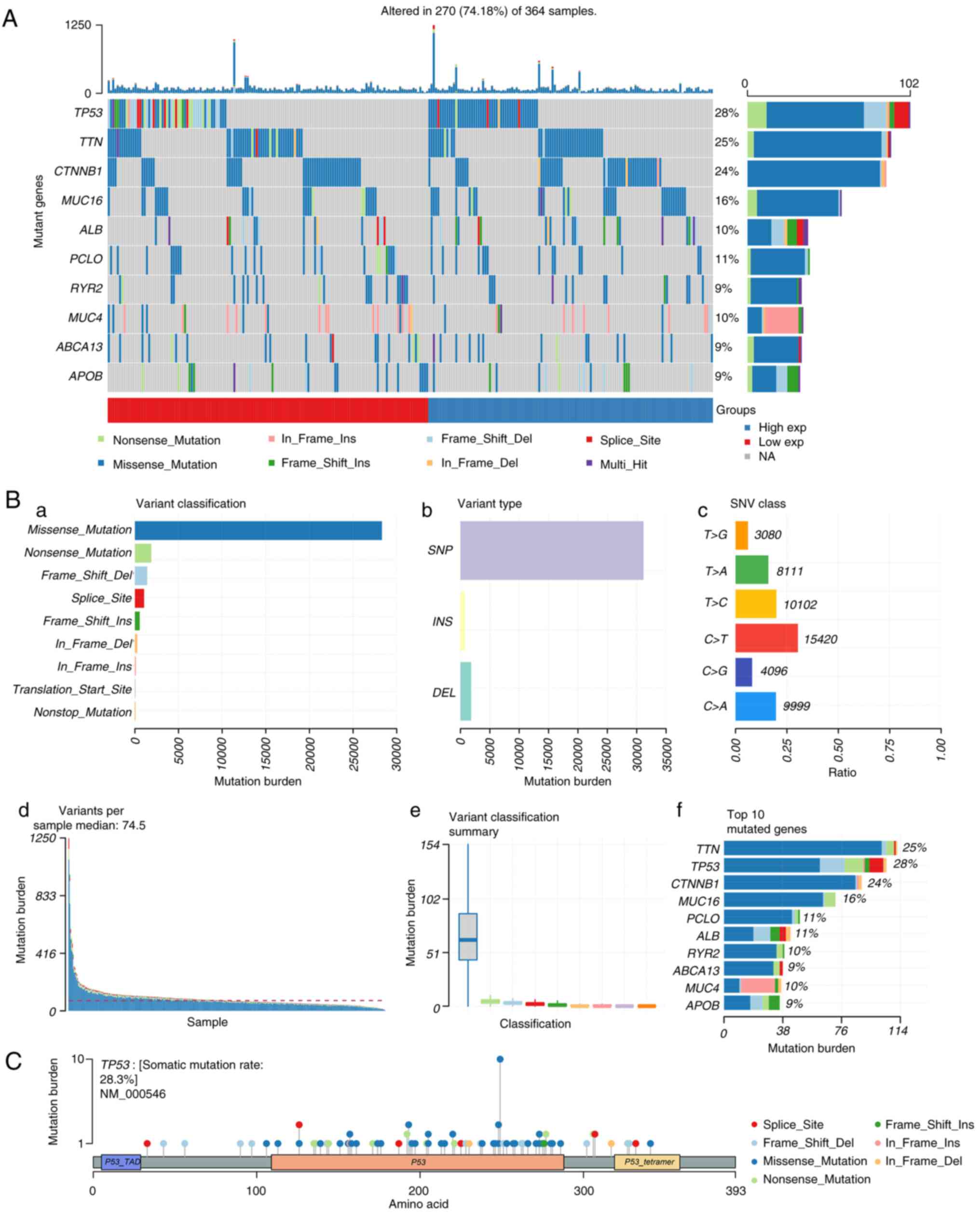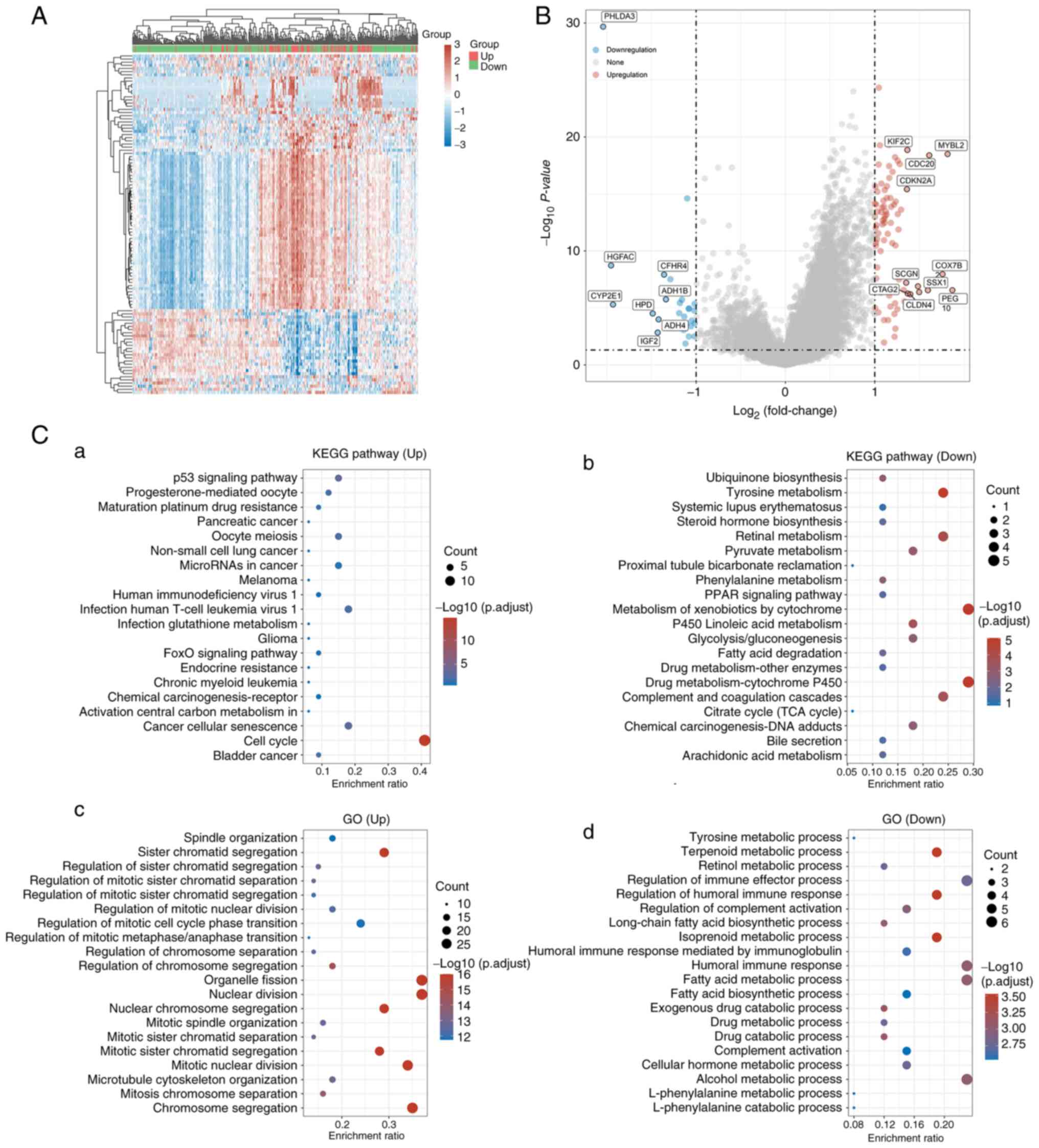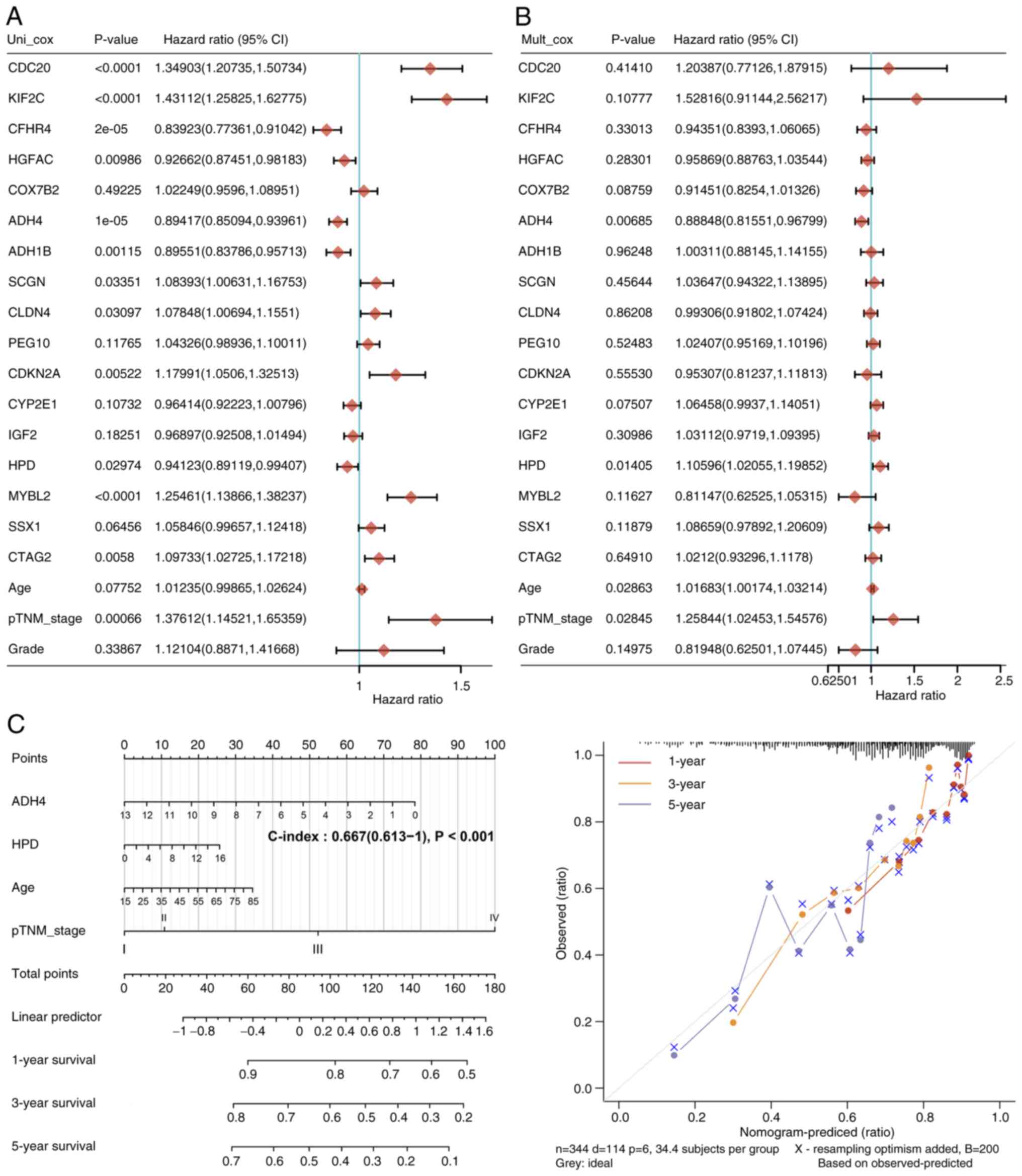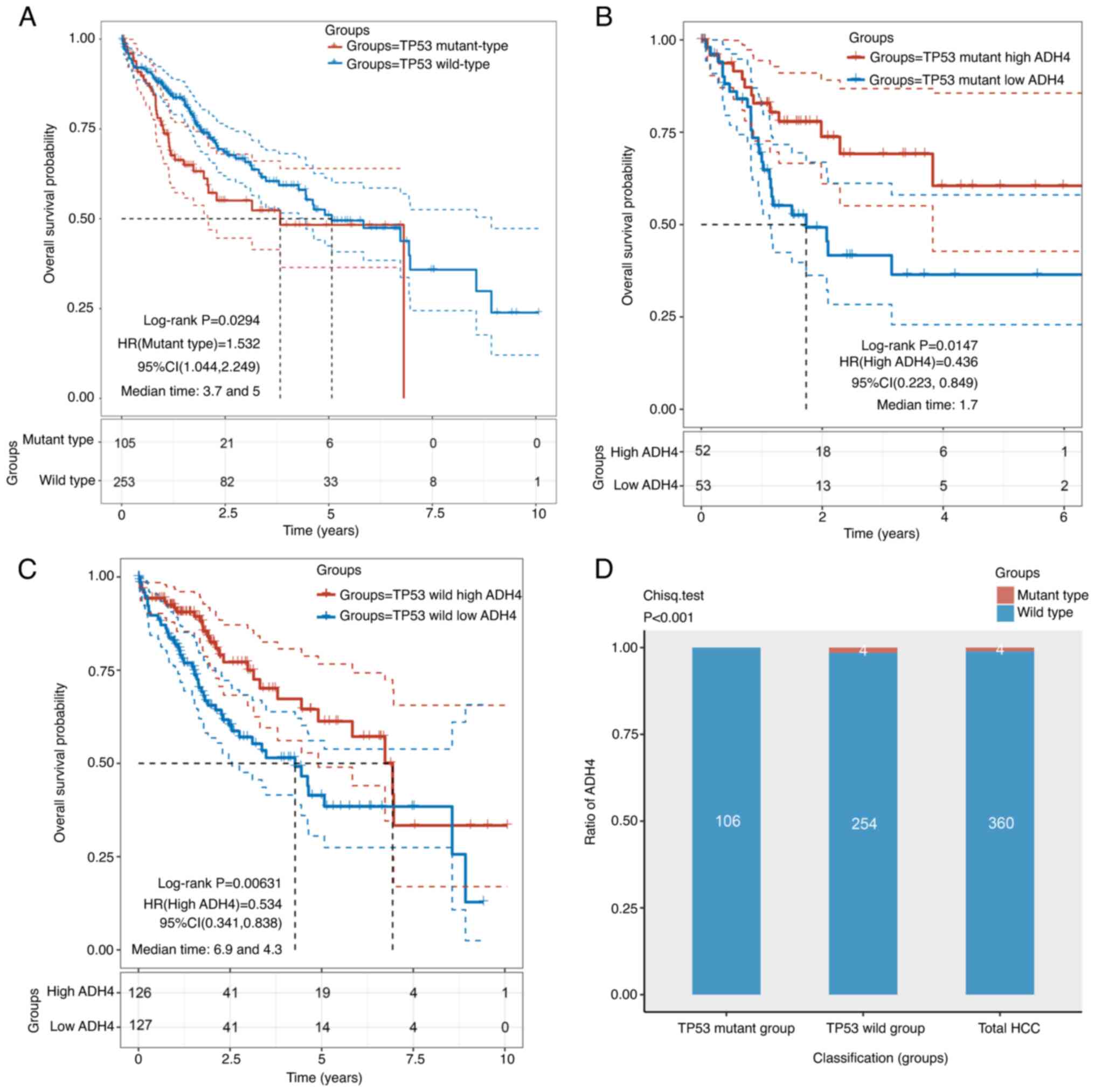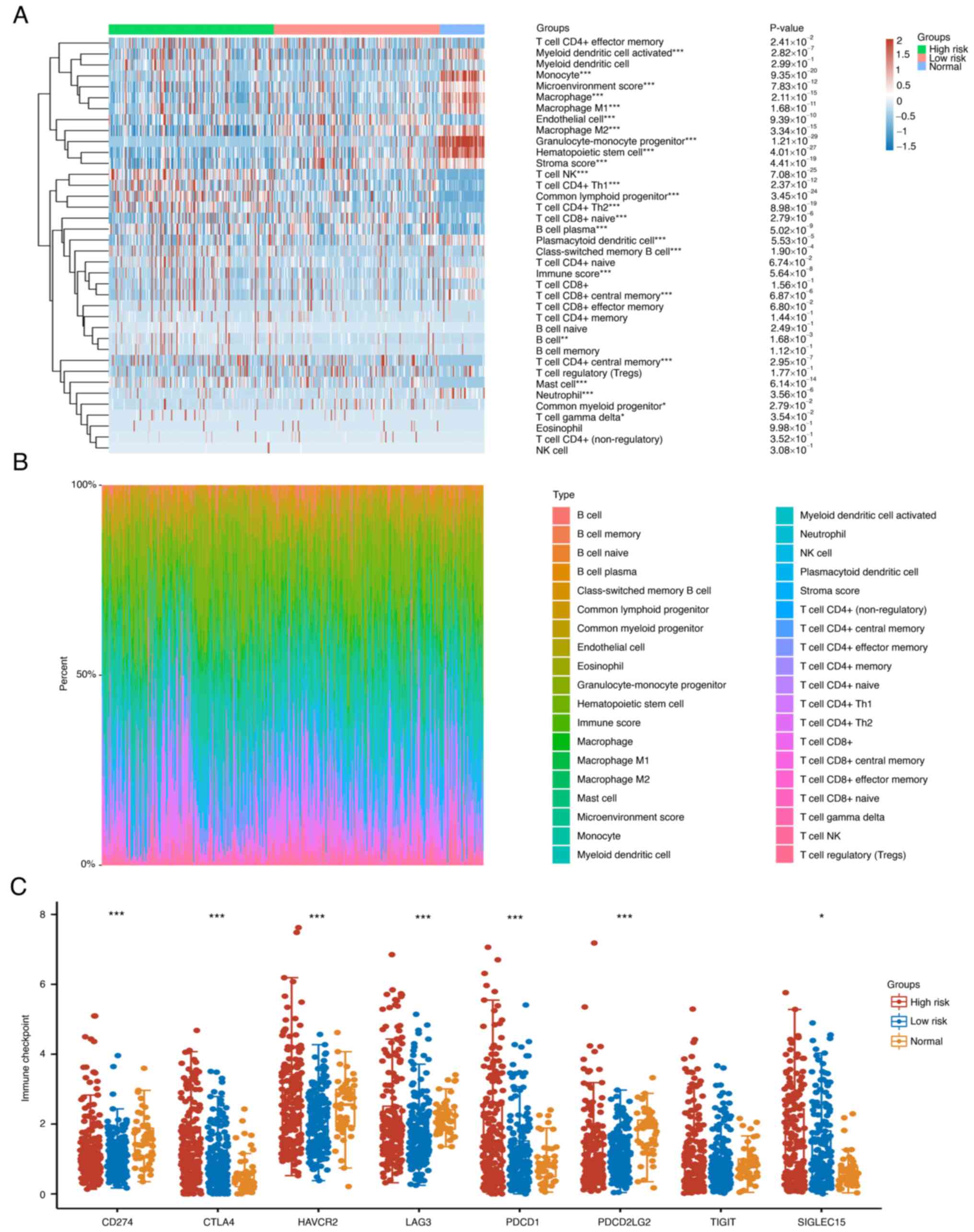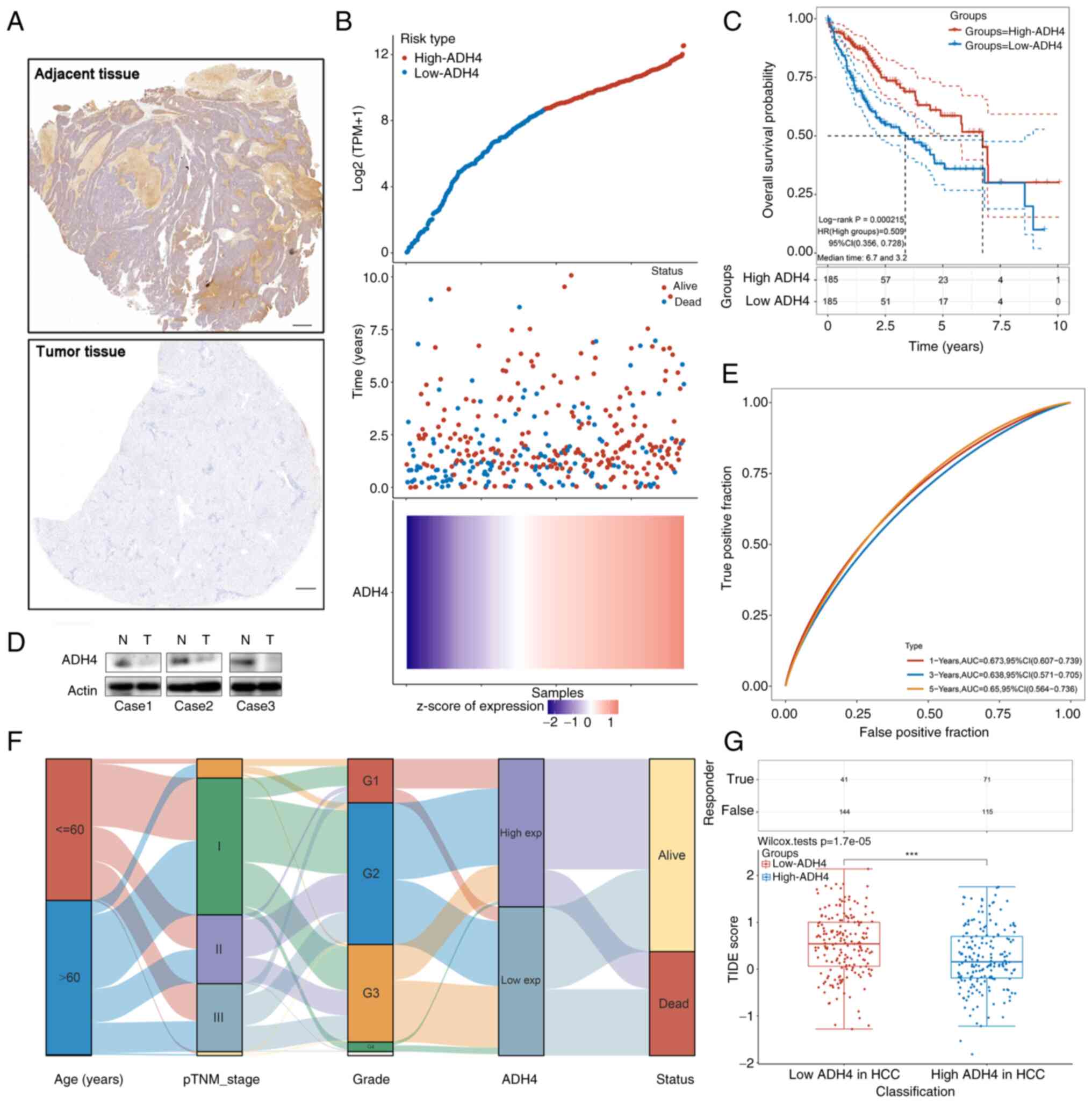|
1
|
Sung H, Ferlay J, Siegel RL, Laversanne M,
Soerjomataram I, Jemal A and Bray F: Global cancer statistics 2020:
GLOBOCAN estimates of incidence and mortality worldwide for 36
cancers in 185 countries. CA Cancer J Clin. 71:209–249. 2021.
View Article : Google Scholar : PubMed/NCBI
|
|
2
|
Petrick JL, Florio AA, Znaor A, Ruggieri
D, Laversanne M, Alvarez CS, Ferlay J, Valery PC, Bray F and
McGlynn KA: International trends in hepatocellular carcinoma
incidence, 1978–2012. Int J Cancer. 147:317–330. 2020. View Article : Google Scholar : PubMed/NCBI
|
|
3
|
Pang Y, Liu Z, Han H, Wang B, Li W, Mao C
and Liu S: Peptide SMIM30 promotes HCC development by inducing
SRC/YES1 membrane anchoring and MAPK pathway activation. J Hepatol.
73:1155–1169. 2020. View Article : Google Scholar : PubMed/NCBI
|
|
4
|
Bray F, Ferlay J, Soerjomataram I, Siegel
RL, Torre LA and Jemal A: Global cancer statistics 2018: GLOBOCAN
estimates of incidence and mortality worldwide for 36 cancers in
185 countries. CA Cancer J Clin. 68:394–424. 2018. View Article : Google Scholar : PubMed/NCBI
|
|
5
|
Jemal A, Ward EM, Johnson CJ, Cronin KA,
Ma J, Ryerson B, Mariotto A, Lake AJ, Wilson R, Sherman RL, et al:
Annual report to the nation on the status of cancer, 1975–2014,
featuring survival. J Natl Cancer Inst. 109:djx0302017. View Article : Google Scholar : PubMed/NCBI
|
|
6
|
Zheng Y, Chen Z, Han Y, Han L, Zou X, Zhou
B, Hu R, Hao J, Bai S, Xiao H, et al: Immune suppressive landscape
in the human esophageal squamous cell carcinoma microenvironment.
Nat Commun. 11:62682020. View Article : Google Scholar : PubMed/NCBI
|
|
7
|
Wang W and Zou W: Amino acids and their
transporters in T cell immunity and cancer therapy. Mol Cell.
80:384–395. 2020. View Article : Google Scholar : PubMed/NCBI
|
|
8
|
Wu J and Cai J: Dilemma and challenge of
immunotherapy for pancreatic cancer. Dig Dis Sci. 66:359–368. 2021.
View Article : Google Scholar : PubMed/NCBI
|
|
9
|
Greer RL, Dong X, Moraes AC, Zielke RA,
Fernandes GR, Peremyslova E, Vasquez-Perez S, Schoenborn AA, Gomes
EP, Pereira AC, et al: Akkermansia muciniphila mediates negative
effects of IFNγ on glucose metabolism. Nat Commun. 7:133292016.
View Article : Google Scholar : PubMed/NCBI
|
|
10
|
Wu R, Chen F, Wang N, Tang D and Kang R:
ACOD1 in immunometabolism and disease. Cell Mol Immunol.
17:822–833. 2020. View Article : Google Scholar : PubMed/NCBI
|
|
11
|
Mouton AJ, Li X, Hall ME and Hall JE:
Obesity, hypertension, and cardiac dysfunction: Novel roles of
immunometabolism in macrophage activation and inflammation. Circ
Res. 126:789–806. 2020. View Article : Google Scholar : PubMed/NCBI
|
|
12
|
Donehower LA, Soussi T, Korkut A, Liu Y,
Schultz A, Cardenas M, Li X, Babur O, Hsu TK, Lichtarge O, et al:
Integrated analysis of TP53 gene and pathway alterations in the
cancer genome atlas. Cell Rep. 28:1370–1384.e5. 2019. View Article : Google Scholar : PubMed/NCBI
|
|
13
|
Olivier M, Hollstein M and Hainaut P: TP53
mutations in human cancers: Origins, consequences, and clinical
use. Cold Spring Harb Perspect Biol. 2:a0010082010. View Article : Google Scholar : PubMed/NCBI
|
|
14
|
Mogi A and Kuwano H: TP53 mutations in
nonsmall cell lung cancer. J Biomed Biotechnol. 2011:5839292011.
View Article : Google Scholar : PubMed/NCBI
|
|
15
|
Duffy MJ, Synnott NC and Crown J: Mutant
p53 as a target for cancer treatment. Eur J Cancer. 83:258–265.
2017. View Article : Google Scholar : PubMed/NCBI
|
|
16
|
Silwal-Pandit L, Langerød A and
Børresen-Dale AL: TP53 mutations in breast and ovarian cancer. Cold
Spring Harb Perspect Med. 7:a0262522017. View Article : Google Scholar : PubMed/NCBI
|
|
17
|
Yang C, Huang X, Li Y, Chen J, Lv Y and
Dai S: Prognosis and personalized treatment prediction in
TP53-mutant hepatocellular carcinoma: An in silico strategy towards
precision oncology. Brief Bioinform. 22:bbaa1642021. View Article : Google Scholar : PubMed/NCBI
|
|
18
|
Meng F, Wu L, Dong L, Mitchell AV, James
Block C, Liu J, Zhang H, Lu Q, Song WM, Zhang B, et al: EGFL9
promotes breast cancer metastasis by inducing cMET activation and
metabolic reprogramming. Nat Commun. 10:50332019. View Article : Google Scholar : PubMed/NCBI
|
|
19
|
Jiang P, Gu S, Pan D, Fu J, Sahu A, Hu X,
Li Z, Traugh N, Bu X, Li B, et al: Signatures of T cell dysfunction
and exclusion predict cancer immunotherapy response. Nat Med.
24:1550–1558. 2018. View Article : Google Scholar : PubMed/NCBI
|
|
20
|
Telloni SM: Tumor staging and grading: A
primer. Methods Mol Biol. 1606:1–17. 2017. View Article : Google Scholar : PubMed/NCBI
|
|
21
|
Pinero F, Dirchwolf M and Pessôa MG:
Biomarkers in hepatocellular carcinoma: Diagnosis, prognosis and
treatment response assessment. Cells. 9:13702020. View Article : Google Scholar : PubMed/NCBI
|
|
22
|
Golonka RM and Vijay-Kumar M: Atypical
immunometabolism and metabolic reprogramming in liver cancer:
Deciphering the role of gut microbiome. Adv Cancer Res.
149:171–255. 2021. View Article : Google Scholar : PubMed/NCBI
|
|
23
|
Sonbol MB, Riaz IB, Naqvi SAA, Almquist
DR, Mina S, Almasri J, Shah S, Almader-Douglas D, Uson Junior PLS,
Mahipal A, et al: Systemic therapy and sequencing options in
advanced hepatocellular carcinoma: A systematic review and network
meta-analysis. JAMA Oncol. 6:e2049302020. View Article : Google Scholar : PubMed/NCBI
|
|
24
|
Llovet JM, Montal R, Sia D and Finn RS:
Molecular therapies and precision medicine for hepatocellular
carcinoma. Nat Rev Clin Oncol. 15:599–616. 2018. View Article : Google Scholar : PubMed/NCBI
|
|
25
|
Zhang Y, Yan Q, Gong L, Xu H, Liu B, Fang
X, Yu D, Li L, Wei T, Wang Y, et al: C-terminal truncated HBx
initiates hepatocarcinogenesis by downregulating TXNIP and
reprogramming glucose metabolism. Oncogene. 40:1147–1161. 2021.
View Article : Google Scholar : PubMed/NCBI
|
|
26
|
Wang Q, Tan Y, Jiang T, Wang X, Li Q, Dong
L, Liu X and Xu G: Metabolic reprogramming and its relationship to
survival in hepatocellular carcinoma. Cells. 11:10662022.
View Article : Google Scholar : PubMed/NCBI
|
|
27
|
Jühling F, Hamdane N, Crouchet E, Li S, El
Saghire H, Mukherji A, Fujiwara N, Oudot MA, Thumann C, Saviano A,
et al: Targeting clinical epigenetic reprogramming for
chemoprevention of metabolic and viral hepatocellular carcinoma.
Gut. 70:157–169. 2021. View Article : Google Scholar : PubMed/NCBI
|
|
28
|
Machairas N, Tsilimigras DI and Pawlik TM:
Current landscape of immune checkpoint inhibitor therapy for
hepatocellular carcinoma. Cancers (Basel). 14:20182022. View Article : Google Scholar : PubMed/NCBI
|
|
29
|
Mantovani F, Collavin L and Del Sal G:
Mutant p53 as a guardian of the cancer cell. Cell Death Differ.
26:199–212. 2019. View Article : Google Scholar : PubMed/NCBI
|
|
30
|
Li L, Li M and Wang X: Cancer
type-dependent correlations between TP53 mutations and antitumor
immunity. DNA Repair (Amst). 88:1027852020. View Article : Google Scholar : PubMed/NCBI
|
|
31
|
Agupitan AD, Neeson P, Williams S, Howitt
J, Haupt S and Haupt Y: P53: A guardian of immunity becomes its
saboteur through mutation. Int J Mol Sci. 21:34522020. View Article : Google Scholar : PubMed/NCBI
|
|
32
|
Jelski W and Szmitkowski M: Alcohol
dehydrogenase (ADH) and aldehyde dehydrogenase (ALDH) in the cancer
diseases. Clin Chim Acta. 395:1–5. 2008. View Article : Google Scholar : PubMed/NCBI
|
|
33
|
Lercher A, Baazim H and Bergthaler A:
Systemic immunometabolism: Challenges and opportunities. Immunity.
53:496–509. 2020. View Article : Google Scholar : PubMed/NCBI
|
|
34
|
Piñeiro Fernández J, Luddy KA, Harmon C
and O'Farrelly C: Hepatic tumor microenvironments and effects on NK
cell phenotype and function. Int J Mol Sci. 20:41312019. View Article : Google Scholar : PubMed/NCBI
|
|
35
|
Garnelo M, Tan A, Her Z, Yeong J, Lim CJ,
Chen J, Lim KH, Weber A, Chow P, Chung A, et al: Interaction
between tumour-infiltrating B cells and T cells controls the
progression of hepatocellular carcinoma. Gut. 66:342–351. 2017.
View Article : Google Scholar : PubMed/NCBI
|
|
36
|
Giannone G, Ghisoni E, Genta S, Scotto G,
Tuninetti V, Turinetto M and Valabrega G: Immuno-metabolism and
microenvironment in cancer: Key players for immunotherapy. Int J
Mol Sci. 21:44142020. View Article : Google Scholar : PubMed/NCBI
|
|
37
|
Nogueira JA, Ono-Nita SK, Nita ME, de
Souza MM, do Carmo EP, Mello ES, Scapulatempo C, Paranaguá-Vezozzo
DC, Carrilho FJ and Alves VA: 249 TP53 mutation has high prevalence
and is correlated with larger and poorly differentiated HCC in
Brazilian patients. BMC Cancer. 9:2042009. View Article : Google Scholar : PubMed/NCBI
|
|
38
|
Liu X, Li T, Kong D, You H, Kong F and
Tang R: Prognostic implications of alcohol dehydrogenases in
hepatocellular carcinoma. BMC Cancer. 20:12042020. View Article : Google Scholar : PubMed/NCBI
|
|
39
|
Edmondson HA and Steiner PE: Primary
carcinoma of the liver: A study of 100 cases among 48,900
necropsies. Cancer. 7:462–503. 1954. View Article : Google Scholar : PubMed/NCBI
|















